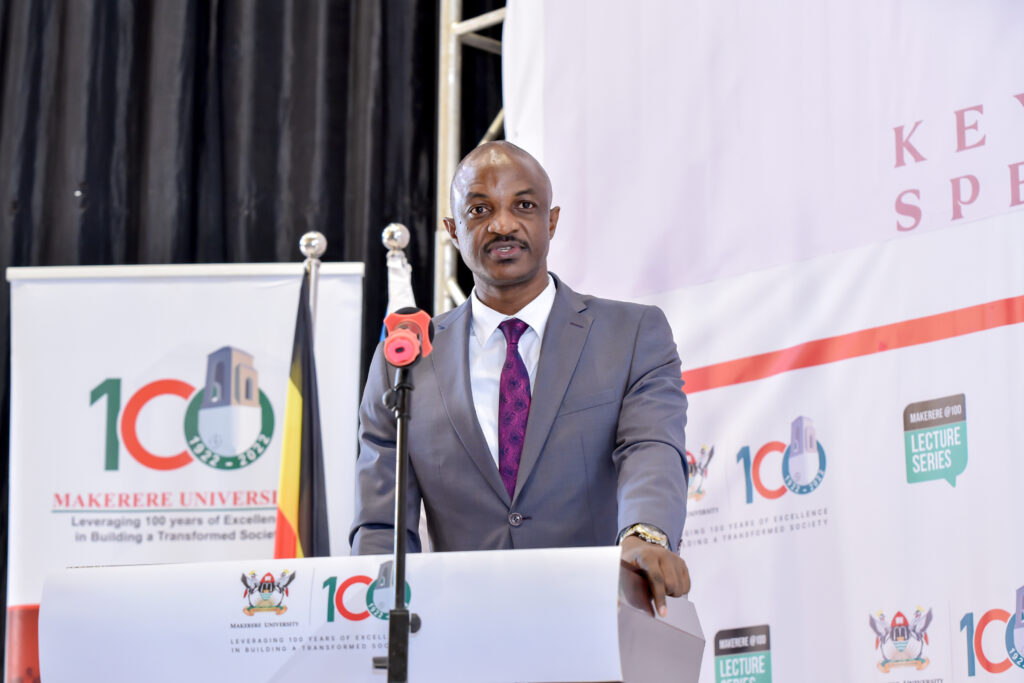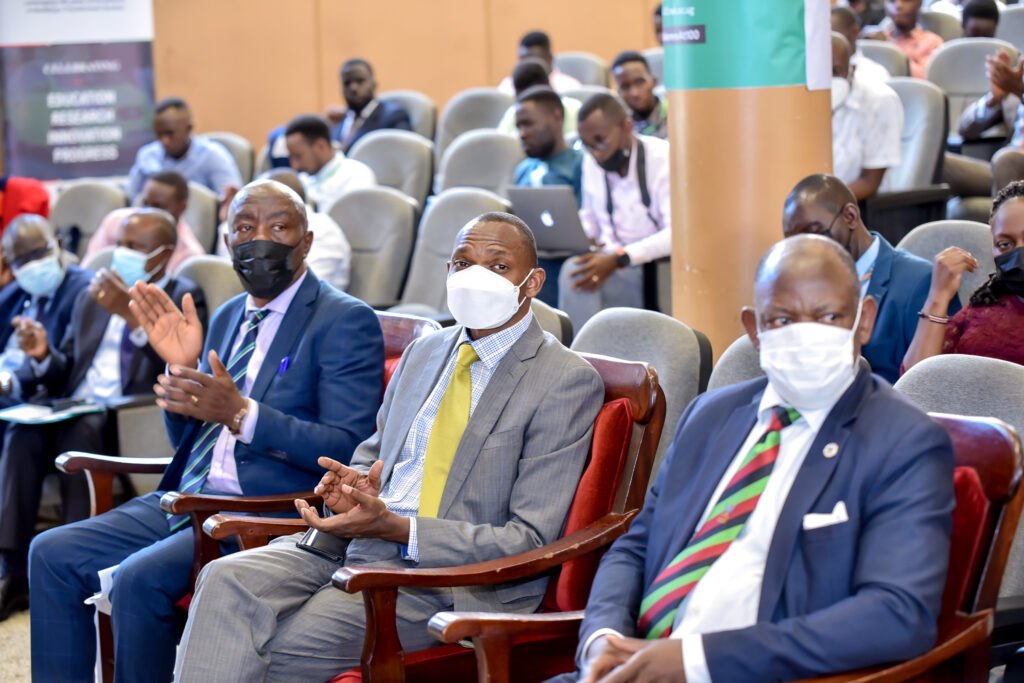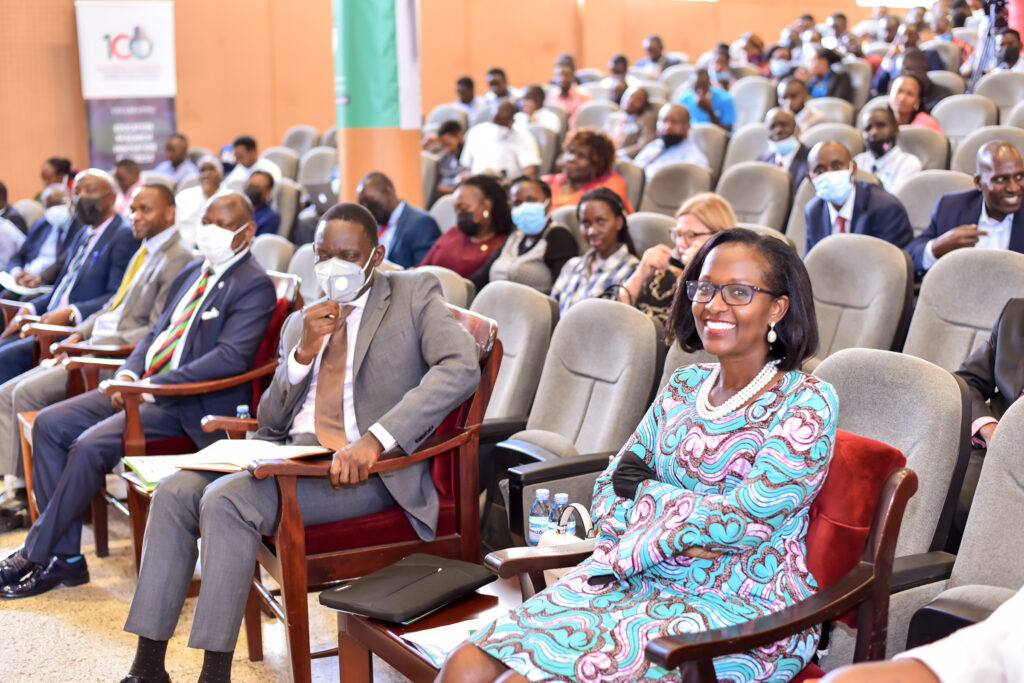Universities should also play a key role in economic and social planning. Enterprise incubators and start-up support should be scaled to boost local job creation and competitiveness of small businesses, Ramathan Ggoobi the Permanent Secretary and Secretary to the Treasury in the Ministry of Finance, Planning and Economic Development Uganda has said.
Ggoobi also said as hosts for the country’s young generations, universities should think about practical ways of averting the growing boomerang generation—young adults who return to their parents’ home after university because they’ve failed to live on their own.
Delivering his keynote speech at the inaugural Tumusiime Mutebile Memorial Lecture under the theme, ‘Economic recovery and resilience in a post Covid-19 world-The role of Higher Institutions,’ Ggoobi said the key to economic recovery now is in the ability of our university to generate the kind of human resource that ultimately will translate into entrepreneurship and innovations
“Apart from promoting greater productivity and work efficiency, education is the primary opportunity equalizer. Probably the key to economic recovery is in the ability of our universities to generate the kind of human resource that ultimately will translate into entrepreneurship and innovations.
Ggoobi said during the pandemic Makerere set up a University Scientific Advisory Committee which was key in advising the Government.
“Universities need to relax a bit on the requirements – both academic and financial – to take on more students and reduce the dropout rate, one of the effects of the pandemic. Please do everything possible not to leave any student behind, particularly those who belong to the most vulnerable socioeconomic backgrounds. Remember, families are going through a very difficult time. So, develop timely, student-centric responses,” Ggoobi said.

Ggoobi said as government, they were committed to continue enhancing funding for universities to support the transformation of higher education in the face of tectonic, long-term shifts in demographics, technology and competition. We shall invest more in online, hybrid and competency-based learning, improved infrastructure, student sponsorship, and most importantly research and innovation.
Ggoobi said that it was an immense pleasure to return to this intellectual powerhouse to honor one of the greatest economists and reformers of our time, and also to talk about economic recovery efforts.
“On behalf of the Ministry of Finance, Planning and Economic Development, and specifically the hundreds of fellow alumni of this great institution working in the Ministry, I am delighted to congratulate Makerere upon reaching 100 years of Building for the Future,” Ggoobi said.
Ggoobi said Makerere University was one of the world’s most prestigious universities. “Its alumni include world leaders, top notch intellectuals, leading business executives, and many other impactful human beings, both living and dead. I thank you for inviting me and enabling me to return to Makerere for the first time as the Secretary to the Treasury of the Republic of Uganda. I started my journey of training as an economist here,” he added.
Ggoobi noted that there were a number of things he was scheduled to do, “but I honestly can’t think of one that would make me happier and proud, than one for the promotion of economics. Until recently, my life’s work (my teaching, my research, my public writing, my community work, and even my twitter and Facebook posts) has been all about trying to demonstrate to fellow Ugandans what I learnt while in the gates of Makerere – that economics is not common sense per se.
Ggoobi said the Covid-19 pandemic had greatly affected the country and the entire world.
“In any case the entire world has been a laboratory and us all the specimens for its torment. From the anguish of losing our loved ones (a world total of 6.23 million souls – and still counting; of whom 3,597 were Ugandans) to a disrupted recovery and higher inflation, the pandemic has plagued the human race at unprecedented scale,”
Ggoobi noted that at its peak the global economic growth declined to minus 3.1 percent in 2020, from 2.9 percent in 2019. “In Uganda’s case, economic activity was cut by more than half. The services sector was most affected, in particular education, transport, hospitality and entertainment activities. The size of the labour force declined with many workers moving from modern and semi-modern sectors into subsistence agriculture.”
He also said the share of working persons in subsistence agriculture increased from 41% to 52% before and after the outbreak of the pandemic. “As we talk now, 6.8 million people (housed in 3.5 million homes) are in subsistence. We have also experienced revenue shortfalls in the past two years yet expenditure needs increased to finance the fight against Covid-19, enforcement of Covid-19 SOPs to keep Ugandans alive.”

On commodity prices, Ggoobi said, “Economists know that it takes time for external shock to manifest themselves. In this case, they have started with prices of essential items, particularly laundry bar soap, fuel, cooking oil, building materials like cement and steel, some food items, and education services.”
He admitted that these had significantly increased in recent months. “As a result, inflation has risen to 3.7% in March 2022. The causes are largely external and supply-side related, key of which is the effect of Covid-19 restrictions which disrupted supply-chains worldwide leading to higher transport costs, shortage of shipping containers, shortage of raw materials, and higher fuel prices. This cocktail has curtailed smooth manufacturing/production and movement of goods and services, leading to increased commodity prices.”
He also attributed the increase in prices to the full opening of economies globally and the Russia-Ukraine war “After Covid had lessened, it led to a swift rise in aggregate demand for a number of goods and services such as fuel, transport, education etc. This has further increased prices. Since crises are like taxis; another one is often the way as one leaves the stage, the Russia-Ukraine conflict emerged as Covid left the stage and has further disrupted supply of goods such as oil, wheat, maize, and sunflower oil, as well as raw materials. The two countries are major producers and exporters of these commodities.
On what the Government was doing, Ggoobi said the causes of the current spike in prices were as a result of; Supply related; External; and Global. “Government policy response, therefore, must focus on addressing the supply constraints most of which are external and affecting the entire world. Anything else implemented would be a wrong medicine to a known ailment.”
He outlined some of the measures being undertaken by the Government to include; “Ensuring that we maintain a competitive environment to support a continuous supply of the goods and services whose stream is currently constrained – that is, fuel, soap, cooking oil, cement, steel, etc.- and avoid creating more shortages. We cannot afford to make demand outstrip supply. Most of the things some people want us to do are good common sense but very bad economics.”
Ggoobi also noted that they were supporting farmers to grow more food to ensure we do not suffer food shortages since food is the main driver of Uganda’s inflation.
“We are also facilitating more exports to take advantage of the shocks, and earn more foreign exchange to pay for the now expensive imports.
On what Mutebile would have done had he still been around, Ggoobi noted Mutebile was the grandfather of the economy we have today.
“Mutebile liberated Uganda from the ‘control model’—the practice of using administrative controls to keep the prices low and revaluing the shilling to make imports cheap. Beginning in 1966 the State of Uganda had assumed a lead in all the major economic activities. The leaders then and the people they led thought this was the best way of ensuring making the economy work for everyone,” Ggoobi said.
He said in 1969, in the bid to enable indigenous Ugandans to “have a say in the economic affairs of their country,” which at the time was dominated by Asians and British immigrants, and “for the realization of the real meaning of Independence”, President Apollo Obote announced a “Move to the Left”, culminating into the infamous 1970 Common Man’s Charter.
“This was the beginning of the control model in Uganda. When Idi Amin took power in 1971, economics was replaced by flawed common sense. As we heard in the numerous eulogies by his contemporaries, Prof Mutebile took the risk to remind the brash and unapprised Amin how economics works, and paid a huge price. Yet many Ugandans then considered him a nationalist.”
Ggoobi noted that even today, many Ugandans silently support Amin’s expulsion and expropriation of Asian property, price and foreign exchange controls and many other economic distortions.
“Generations of my students, none of whom was born by 1972 when Amin executed the economic war, as well as various groups of people I have taught Uganda’s economic history during my, often expressed support and silent admiration of Amin’s ‘nationalist credentials’”.
Ggoobi said a young Mutebile was conscious enough to comprehend Amin’s economic distortions and human rights violations, and risked to oppose them. Yet, like many budding economists of the time, Mutebile started as a socialist. He quickly mutated into a liberal thinker and went on to help Uganda to get rid of economic distortions.
He outlined some of the economic distortions Mutebile helped Uganda get rid of;
“First, Mutebile helped this country to get rid of price control. It resulted in an emergency of black markets (magendo) involving hoarding of basic groceries and other essential commodities.”
He also noted that Mutebile kicked out smuggling in Uganda. “Due to economic mismanagement, the past governments were unable to collect enough tax revenue to finance government expenditures. To deal with this challenge, the governments resorted to levying exorbitant import tariffs to raise revenue. The high tariffs forced traders to engage in smuggling,” Ggoobi said.
He further noted that Mutebile, “helped Uganda to stop printing money to finance budget deficits. The Bank of Uganda had been turned into a printing press for money. Consequently, inflation had galloped into triple digits.
Mutebile also saved Uganda from black markets. “These used to emerge as a result of fixed exchange rates. For example, the official exchange rate in 1986 was fixed at sh14 and sh50 per US dollar for essential and non-essential imports respectively. Fixing of the exchange rate led to shortage of foreign exchange and emergence of black markets (the Kibanda market) for foreign currencies. International trade was severely affected leading to a shortage of imported goods and services.
Ggoobi also said, Mutebile helped Uganda to restore fiscal discipline. “He re-established the discipline of government, maintaining a fiscal position that is consistent with macroeconomic stability and sustained economic growth. Government avoided excessive borrowing and debt accumulation; committed more spending of the national budget on productive activities in the economy.

“It was Mutebile who masterminded the merger of the Ministry of Finance (MoF) with the Ministry of Planning and Economic Development (MoPED) in March 1992. This improved coordination of macroeconomic management. Within one fiscal year, inflation reduced from 54.5% in 1992/93 to 5.1% in 1993/94,” Ggoobi said.
Ggoobi further said that as pioneer PS/ST, Mutebile implemented three basic principles: Prudence by ensuring that expenditure by government was in line with revenue, and limiting borrowing strictly to necessary needs; Sustainability insisting no expenditure commitments that couldn’t be sustained over the medium and long term; and Consistency: all expenditures in line with the government’s long-term goal of building an independent, integrated and self-sustaining economy.
Ggoobi said Mutebile jealously defended the independence and authority of BoU over monetary policy (BoU Act); regulation and supervision of banks (FIA); and performance of its functions without subjecting it to the direction or control of any person or authority (Constitution). This transformed the bank into a credible institution with the prime objective of maintaining price stability.
“Mutebile led the crusade of private sector development to reduce government and its inefficiencies in doing business. All these reforms enabled Uganda recover and sustain growth at an impressive average annual rate of over 6.5% per year; maintained single-digit inflation averaging 5% for much of the period Mutebile was in charge at the Treasury and BoU; and facilitated poverty reduction from 56% in 1992 to 19.7% in 2014.
He also talked about the unfinished business Mutebile would want us to address saying the Government was now focused on the unfinished business not only to maintain Mutebile’s legacy but to propel Uganda to the level he and all of us want it to get to.
“In the medium term our efforts and resources will be concentrated on addressing the following: A large subsistence economy that has crippled household incomes and the purchasing power of the population; High unemployment and underemployment of the young people; High cost of credit, electricity and transport, which lower competitiveness of Ugandan products in regional and international markets; Low investment in scientific research and development to inform innovation and policy.
He also noted that they would focus on; Low level of industrialization; Land ownership and security, land use and land fragmentation; High levels of corruption in government and private sector; Limited export markets; and Quality of healthcare and education services.
The Tumusiime Mutebile Public Lecture will be an annual event which will serve as an intellectual rallying point for scholars, students and the general public by drawing eminent scholars and government representatives from across Africa and the globe in intellectual conversation and discourse that will proffer solutions to crucial issues in building a recovering and resilient economy in Uganda.

